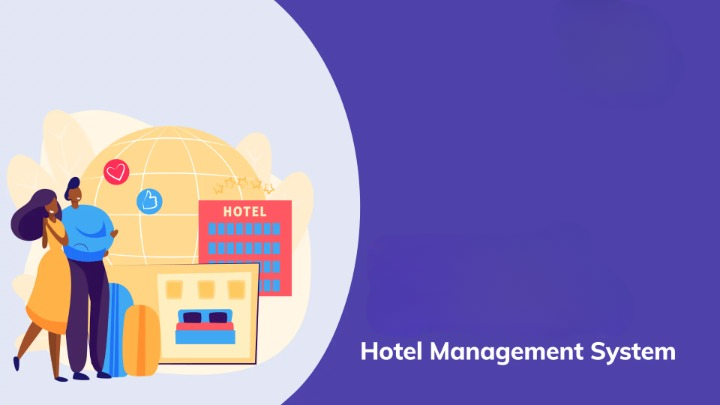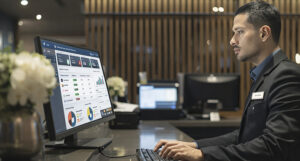The smooth running of hotel operations is essential to delivering a first-rate guest experience in the hectic world of hospitality. Let me introduce you to Hotel Management Systems (HMS), which are advanced software programmes created to improve and simplify many hotel administration tasks. The main characteristics and advantages of Hotel Management System, which have completely changed the way hotels run, will be discussed in this article. In the ever-changing world of hospitality, productivity and client happiness are critical. The creation of hotel management software specifically suited to the particular requirements of the sector can greatly improve operational procedures and improve the visitor experience.
In this post, we’ll examine the essential procedures and factors in developing strong hotel management software.
- 1. Reservation and Booking Management: Hotel Management System make online reservations simple for visitors by streamlining the reservation and booking procedure. These technologies guarantee correct booking information by giving real-time updates on room availability. As a result, there is less chance of overbooking and an increase in overall visitor satisfaction thanks to a more effective and well-organized reservation system.
- 2. Automation of Check-In and Check-Out: Gone are the days of lengthy lines at the front desk. Automated check-in and check-out procedures are provided by hotel management system, saving visitors’ wait times. Digital check-in choices contribute to a more streamlined and effective front desk operation in addition to improving the guest experience.
- 3. Inventory and Room Management: The foundation of a successful hotel is effective inventory and room management. Hotel employees may more easily monitor room availability, assign rooms based on guest preferences, and organize housekeeping schedules thanks to HMS’s centralization of room inventory management. Optimized room utilization and increased operational efficiency are the outcomes of this.
- Invoicing and Billing: Hotel Management System streamlines the process of invoicing and billing by automating the computation of room rates, extra costs, and all relevant taxes and services. This helps to speed up and improve the accuracy of the check-out process while also lowering the possibility of billing errors. Improved financial management is further achieved by seamless interaction with accounting systems.
- Reporting and Analytics: Making decisions based on data is essential to effective hotel management. In-depth analytics and reporting capabilities from HMS are available, providing information on visitor preferences, revenue streams, and occupancy rates. Real-time data empowers hotel managers to make well-informed decisions that result in enhanced performance and more successful marketing campaigns.
- Guest Relationship Management (CRM):Establishing and preserving a solid rapport with guests is essential in the hospitality sector. CRM features are frequently included in hotel management system, which enable establishments to administer loyalty programmes, keep track of visitor preferences, and customize visitor experiences. This results in more visitor satisfaction and the possibility of coming back.
- Security and Compliance: Hotels place the utmost importance on safeguarding private visitor information. Strong security measures, such as data encryption, secure authentication, and frequent security audits, are implemented by hotel management system. Ensuring compliance with data protection regulations fosters guest confidence in the security of their personal information.
Some of the additional points to be paid attention have been justified as:
- Recognizing the prerequisites: It’s critical to comprehend the particular needs of hotel management software before starting the development process. Determine the essential features, including room assignment, invoicing, reservation administration, check-in and check-out procedures, and system interaction with other hotels.
- Selecting an Appropriate Technology Stack: Choosing the right technological stack is an important choice. Select a programming language and framework that meet the needs of the project. Think about things like security, scalability, and compatibility with other tools and APIs.
- Designing User Experience (UX) and User Interface (UI): Make a user interface that is aesthetically pleasing and easy to use. Prioritizing user-friendliness is important for both hotel employees and visitors. To guarantee a seamless user experience, incorporate elements like drag-and-drop interfaces, clear navigation, and responsive design.
- Management of Reservations and Bookings: Provide a reliable online reservation system so that visitors can make hotel reservations. Add functions such as transparent pricing, real-time availability updates, and guest preference customization for bookings. Make sure that any online transactions use a secure payment gateway.
- Procedure for Check-In/Check-Out: Establish effective workflows to streamline the check-in and check-out procedures. To cut down on visitor wait times, introduce computerized check-in choices. Connect the programme to key card access systems to ensure a seamless room access process.
- Inventory Control and Room Management: Establish a centralized system for the inventory management of rooms. Include functions for classifying rooms, monitoring their availability, and assigning rooms automatically according to visitor preferences or loyalty levels. Provide resources for scheduling housekeeping and room maintenance.
- Invoicing and Billing: Create a thorough billing module that addresses numerous additional fees for guests, such as taxes, supplementary services, and lodging prices. For smooth financial management, provide automated invoicing and interaction with accounting systems.
- Connectivity with External Systems: Think about combining the hotel management software with other widely used systems in the hospitality sector to improve functionality. Tools for customer relationship management, property management, and point-of-sale systems may fall under this category.
- Security Procedures: Give the protection of sensitive data and visitor information a first priority. To guard against potential weaknesses, put encryption techniques, safe authentication procedures, and frequent security audits into place.
- Quality Control and Testing: At every level of development, thoroughly test the software to find and fix any flaws or difficulties. To make sure the software satisfies the demands of both hotel employees and visitors, conduct usability testing. Constant quality control is necessary for supplying a dependable product.
- Instruction and Execution: Give hotel employees thorough instructions on how to operate the new software. Throughout the implementation phase, provide continuous help to handle any issues and guarantee a seamless transition.
In summary:
Creating hotel management software necessitates a calculated strategy centred on improving guest pleasure and operational effectiveness. By selecting the appropriate technological stack, keeping user experience top of mind, and comprehending the particular needs of the hospitality sector, you may develop a potent tool that improves hotel operations management as a whole. Hotel management systems have emerged as essential tools for contemporary hotels to improve operational effectiveness and provide an exceptional guest experience. These solutions enable hoteliers to maintain an advantage in a fiercely competitive market by streamlining procedures, streamlining room management, and delivering insightful data via analytics. The capabilities of Hotel Management Systems will develop along with technology, influencing the direction of hospitality management in the future.



